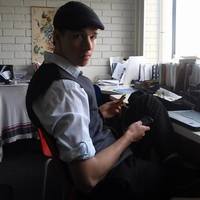B2B: How to Volunteer to Teach North Korean Refugees
This is a writing sample from Scripted writer Mike Smit
I was early to the matching session for Teach North Korean Refugees, so I chatted with the other volunteers as I waited for it to begin. Just before the session started, a young Korean girl with a bright summer dress and stylish auburn hair came in and sat to my left. I said hello to her. I had just spoken to a North Korean for the first time in my life, and I didn't realize it. I don't know how I expected a North Korean refugee to appear, but certainly not like this. I didn't recognize that she was North Korean until my greeting fell flat because she didn't understand what "How are you?" means. A thousand questions raced through my mind once I realized where she was from. I've been teaching English for a long time and I've met people from every part of the world. But I had never met a North Korean before. Hardly anyone has. It's the most secretive nation on Earth. The whole world is hungry to sweep aside the veil of propaganda on each side and see what North Korea is really like. And there she was, all the answers to my many questions, sitting in a high school desk chair right next to me. On top of that, she was excited to get out into the world and finally have her voice heard. But first, I had to teach her what "How are you?" means. TNKR'S MISSION Casey Lartigue and Eunkoo Lee started TNKR in March 2013 and it became an official NGO in May 2015. Despite being such a young nonprofit, TNKR has already made large steps. One of its students and former ambassador, Yeonmi Park, has been able to use her English ability to address the UN and to write a book in which she talks about the desperation of daily life in North Korea as well as the hardships that refugees must face when they defect. North Korean refugees living in Seoul say that one of the biggest problems they had with transitioning to life in South Korea was learning English. English is required to get through university, to get a job, and even to use the internet. More importantly, English is necessary to build bridges between North Korean people and the rest of the world. As of November 1, TNKR has connected over 200 North Korean refugees with about 300 volunteer tutors. The Ministry of Unification's website states that there are over 26,000 North Korean refugees in South Korea, but TNKR co-director Lee tells me those statistics are out of date—that number has already jumped up to 28,000. Every year, at least a thousand new North Korean refugees arrive in South Korea. There's tremendous room for TNKR to grow, but they need more volunteers to do it. YOUR ROLE IN TNKR The first thing you'll do as a TNKR volunteer is meet at the TNKR headquarters near National Assembly Station or at the new TNKR Study Center located within the Bitcoin Center in Seoul. You'll have a brief orientation with Casey and a few other volunteers to go over how the organization works. You'll learn that TNKR operations are split into two programs called Track 1 and Track 2. Any North Korean refugees who want to improve their foreign language ability can apply to Track 1, so this is the track most volunteers join. Students have learned Spanish and even Latin through TNKR, but the focus is on English. English ability in this track varies from student to student. Most are at the conversational level and want to practice speaking. But if the student is new to South Korea, they'll need the basics. This is fun because you can teach almost anything and see quick progress. I taught one class where we practiced prepositions just by playing with erasers for 90 minutes. You'll have an advantage with low level students if you can speak Korean, so TNKR welcomes bilingual volunteers. At the same time, some refugees prefer native speakers who will only speak English during conversation practice. There's a role for everyone here. Track 2 is a secondary program which focuses on public speaking skills for refugees who want to forge global connections using English. Some refugees want to do business in English, improve their presentation skills, or advocate for human rights. TNKR hosts speech contests where Track 2 students can practice giving English presentations in front of a live audience. With the program's assistance, TNKR refugees have gone on to deliver speeches in South Korea, China, Hong Kong, and the United States. Two former TNKR students have published books. RELATING TO REFUGEES During the orientation, TNKR will ask you not to pry into your students' former lives in North Korea. Many students probably have stories they would rather forget, and it's not necessary to talk about them during an English class. But sometimes those stories bubble up naturally. This happened to me with Ji Yoon, when her father–who still lives in North Korea–called her in the middle of our lesson using a phone line that's illegal there. When she finished the call, Ji Yoon told me, "My father give me money." I asked for clarification. "You mean he gives you money, or that he wants you to give him money?" She said: "I give him money. North Korean people…" She patted her belly. "Hungry." The refugees are energetic and positive students, but it's moments like this that remind me what's at stake in TNKR's mission. If you're teaching English in the greater Seoul area, you have a unique opportunity to make a difference. You won't find the same opportunity in that viral video with 200,000 shares or that online petition with 5,000 signatures. Awareness is important, but this is different. This opportunity has a name, a face, and she's sitting just across the table from you.
